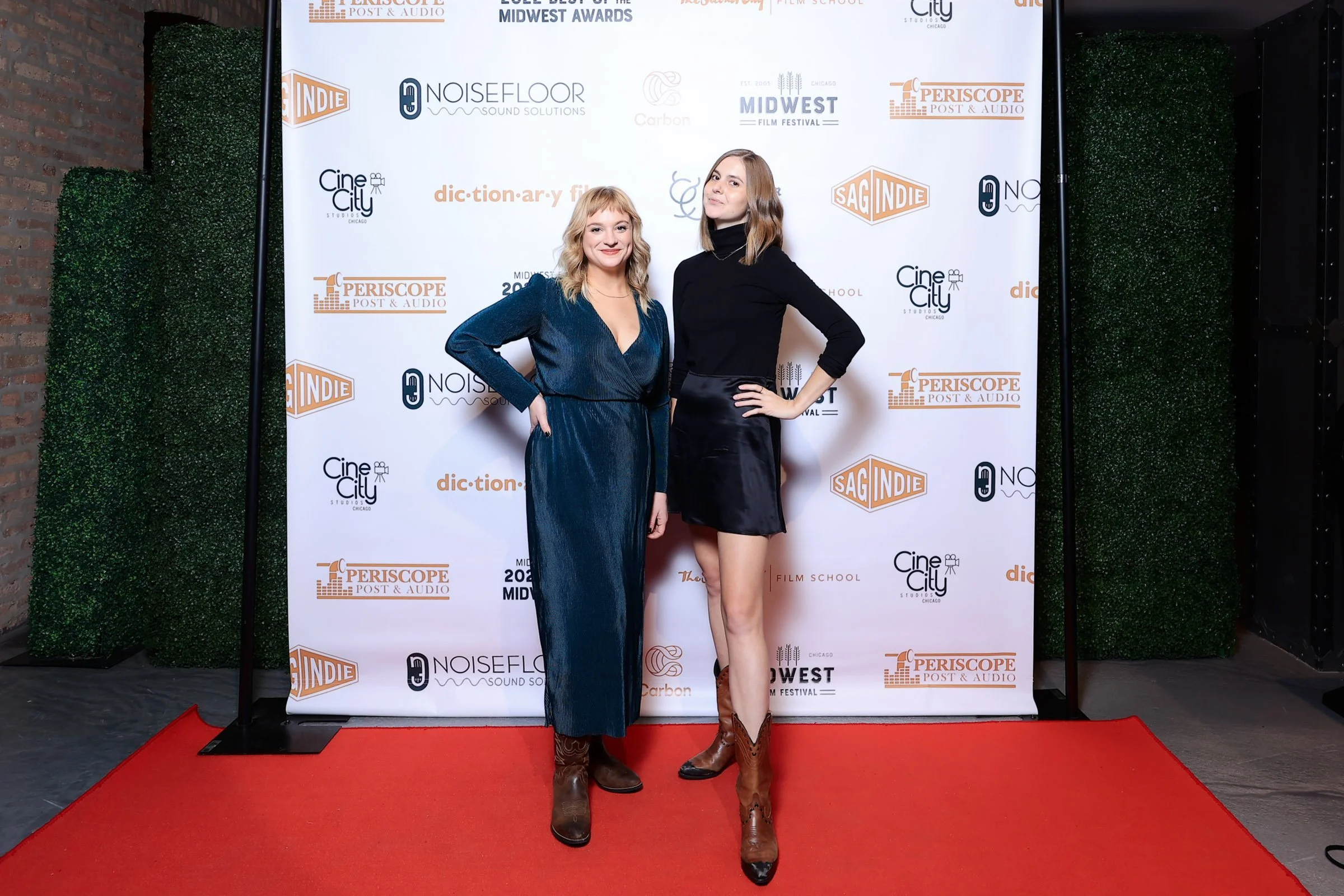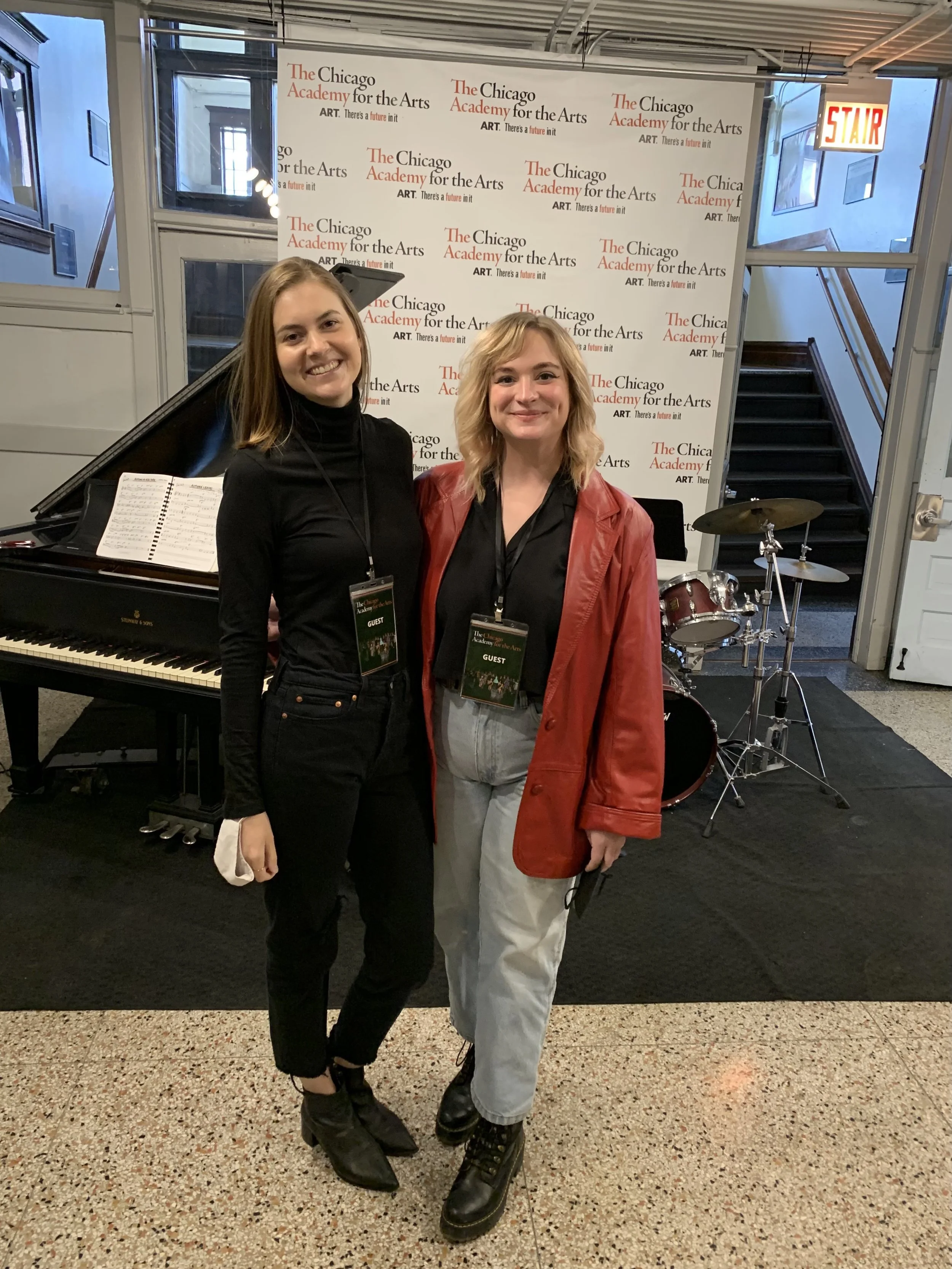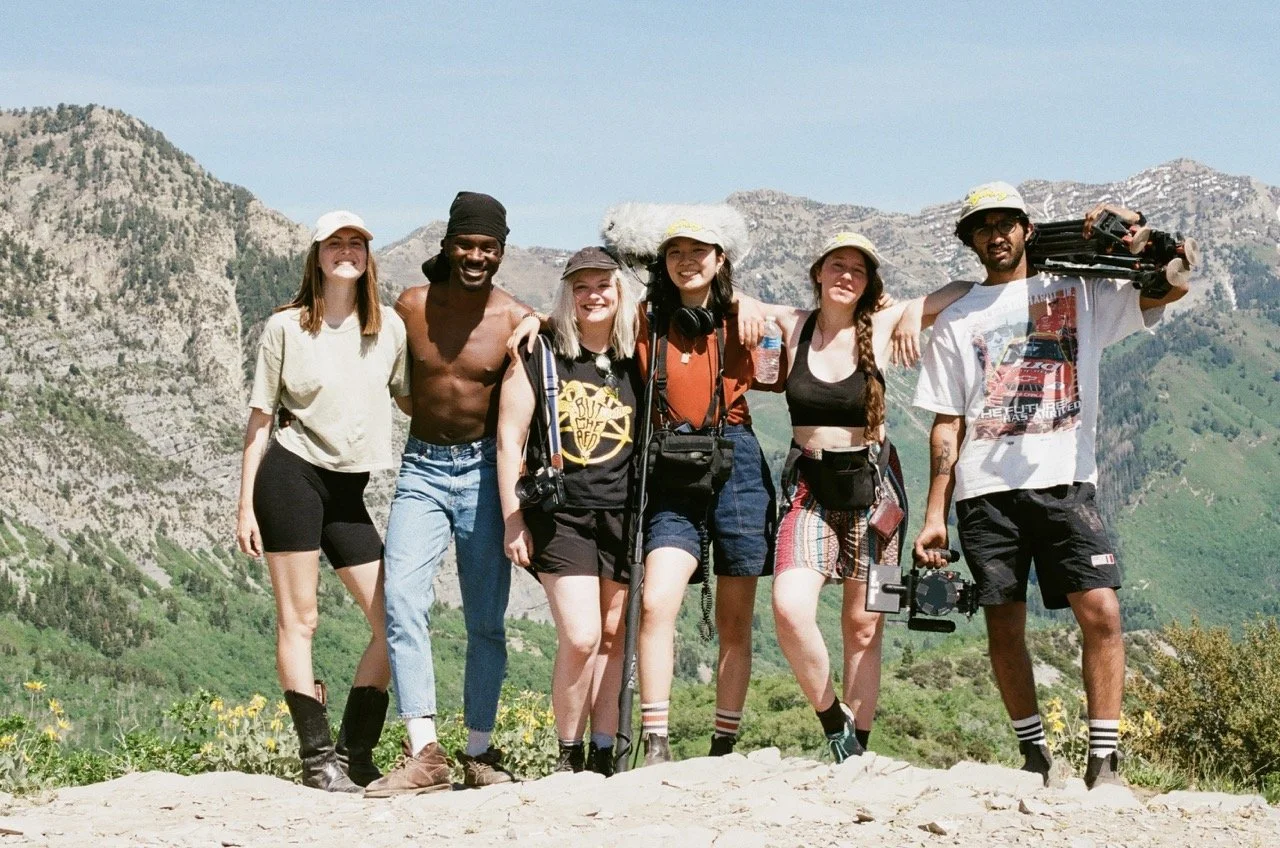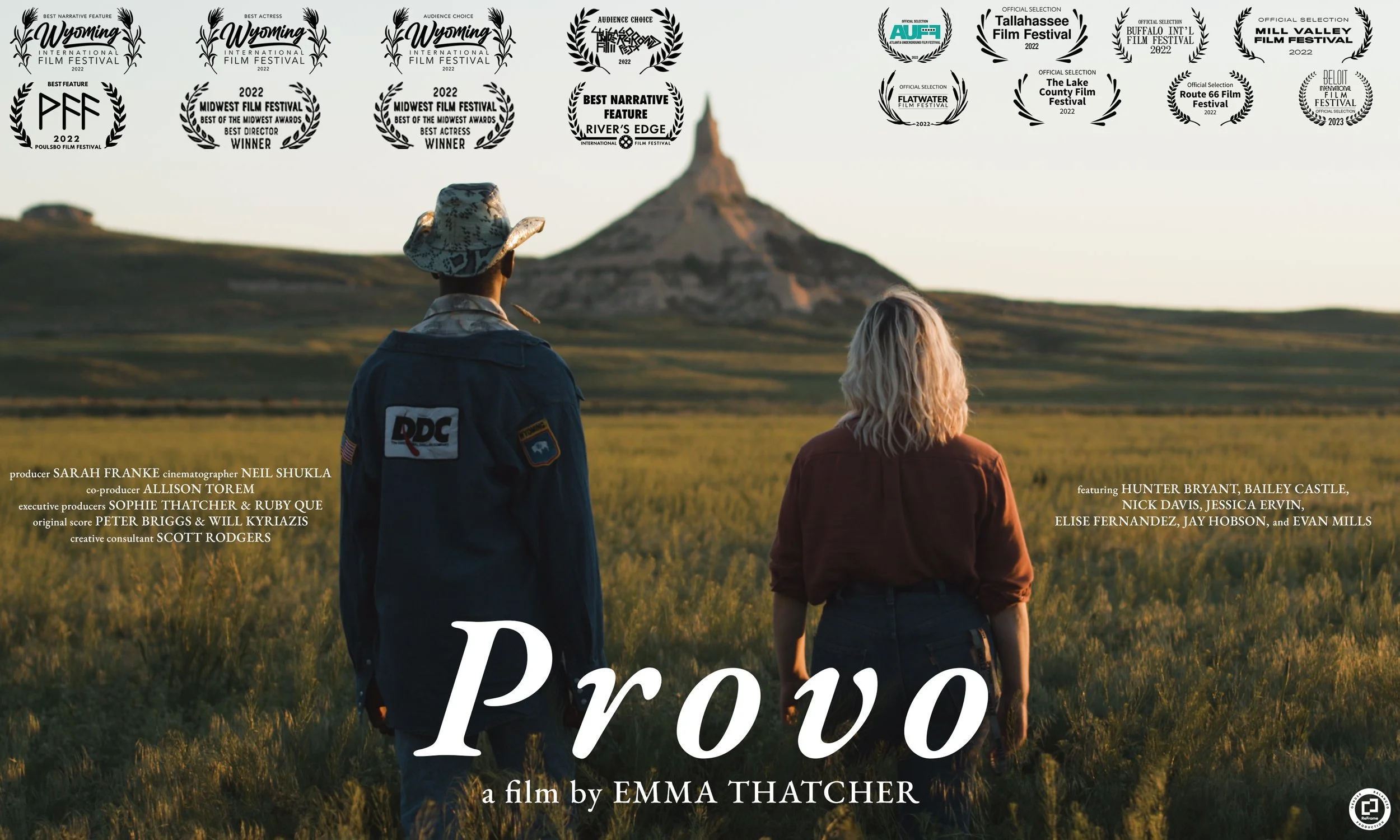Alumni Stories: Emma Thatcher (Musical Theatre '10) and Sarah Franke (Media Arts '11)
This interview has been lightly edited for length and clarity.
Academy Alums Emma Thatcher (Musical Theatre, 2010) and Sarah Franke (Media Arts, 2011) teamed up this past year to write, direct, produce, and edit their feature-length film, Provo. After finding inspiration through her own journey with religion, Emma used the writing principles learned from a recent class to bring the film to life. With the partnership of Sarah, a successful documentarian/filmmaker, the two set off on a national road trip to capture the striking imagery and moving story that makes Provo feel like a folk song. After premiering the picture at nearly a dozen festivals (with several awards to match), Emma and Sarah are looking ahead on how to collaborate again.
Check out the story of how two alums created an award-winning film with only a few cars, a few friends, and a few dollars:
What’s your Academy story?
Emma: I was in Musical Theatre, and I mostly came here because my family moved from Hyde Park to Lake Forest. I was an angsty teen and I hated Lake Forest. I had done choir and was mostly a writer before attending The Academy and I needed a reason to come here, so I was like “musical theatre!”
I started as a sophomore and my sophomore year was like all dance because, at the time, you were supposed to start with your worst thing and dance was my worst. I was not meant for ballet. Then I went to undergrad for acting, and then I got really into film and started to make my own stuff.
I’m still friends with almost all of my high school friends. We are still really close and see each other all the time.
Sarah: I came in my junior year. I had been at Evanston High School, and a friend of mine from middle school, Becky, transferred here our freshman year of high school. The Academy was on my radar but I hadn’t really thought about coming here. I had been making films my whole life; at sleepovers I would always make my friends be in all my films. At some point I put it together that film was something I could pursue and that kind of went alongside deciding to apply here and switch it up.
I spent my junior and senior year here in Media Arts – it was just film and writing – and it was my first of three film school experiences. I went to college for film and got my master’s in film, so I always say I have gone to film school three times. The Academy definitely laid a foundation for those other programs.
My bachelor’s was Film and Television Production – I specifically picked a program where you didn’t have to specialize, because I wasn’t ready for that. For my master’s, I studied Documentary Film in London. I’ve now ended up primarily focused on documentaries.
Tell me about Provo and the inspiration behind it.
Emma: I have been making short films, but I took a writing class with a friend from LA and I learned the 3-act structure for the first time, and I got a really solid outline from that. And I am an ex-Mormon and Provo is about an ex-Mormon who finds out that her estranged father is sick in Provo, Utah, so she road trips across the country to make peace with her past. It’s very much, like, an on the road movie.
I had made an outline for a short that had some of the narrative elements that are in the feature, but my friend told me “this feels like the beginning of a story” – and it really was. And then I expanded it into a feature.
Sarah: It’s funny because Emma and I knew each other, but we weren’t really friends in high school. Over the years, we ended up following each other on Instagram. She had been posting “I’m going to make my movie soon!” and I just sent her an email because I had just moved back to Chicago. And then we met and suddenly I was producing it and it just went off from there.
Does it feel autobiographical to you in a way?
Emma: No, my character is a bit of a monster (and I think I’m a better person than that). But it’s structured very much like a narrative, so we’d shoot in my apartment or in my car, so in that way it feels like myself, but ultimately no.
How did you settle on your roles in the process?
Emma: I wasn’t sure about being an actor in it, but I was sure about everything else. I had kind of been making everything holistically – like figuring out how to do everything out on my own. I hadn’t been on sets for my projects where there was a big crew, so it was usually like a couple people doing multiple things – which was what I was used to – and that’s kind of what happened on production for Provo. It was such a small crew that everyone had many roles.
I knew I wanted to edit it. One day I’ll be able to relinquish control and let someone else edit, but I am not quite there yet. Acting-wise, I was kind of on the fence, but I was thinking “how am I going to find another ex-Mormon that is basically like me?” It felt like I had to for production reasons, more so.
For performance stuff, I would ask Sarah or my cinematographer, and everyone was really open with their notes, so I was able to trust the people behind the camera. I hadn’t acted in a while, like not in this big of a role, so I would still have to put the dialogue in my own words (even though I wrote the dialogue), so a little bit of improvisation helped me find the naturalism that I really like.
Was there room on set for people to explore that improvisation you talked about?
Emma: We would just do it in takes. We would do little rehearsals before, but I felt like we really shot through our rehearsals. I think one of the reasons why editing took so long was because there were so many options. Scenes took really different directions because of the improvisational nature of the footage.
I imagine with a small production you wore a lot of hats. What was that like?
Sarah: It was fun because I got to work on things that I hadn’t in awhile. I got to work as an AC and take slates; it was just really fun. I was able to culminate and tap into different aspects of my film journey. I feel like, in a lot of ways, we did make it like a documentary. This was my first step back into narrative in a while. We went on the road trip, we shot through rehearsals – it was just very organic and we knew who the characters were and what the story was, and we kind of just went for it. Everyone had to have that same headspace of “okay, whatever comes up!”
I’ve found in the last couple of years that I am a pretty good producer, I had a job as an associate producer, and I was ready to take this project on. For me, I was starting to get disillusioned with the film industry – which is part of the reason why I went into documentary – with the big sets and the Hollywood of it, all of it. But making Provo was almost like being back in high school – making films with your friends and everyone filling in where they are needed, and that is the style that works for me.
How did your documentary background influence the production of Provo?
Sarah: It influenced the production a lot, because in my personal experience with narrative film, which is what I did my undergrad in, it’s a style that’s very by the book, but with documentary it’s very free. You don’t have to worry about permits or the radio being on in the background, because it’s documentary! So that was what was mind blowing to me, that freedom. We just applied that to this production.
I think there are film restrictions that there don’t need to be. We didn’t need to stick to those as closely, for different reasons, but we were able to shoot in a way that was very lowkey. I think my documentary experience is a part of that, but it’s also the way Emma has come into making films, and everyone on the crew was able to be in that mode.
As you continue, are there any other roles you’d prefer to take on?
Emma: I mean, for my next feature, I want to be behind the camera. Just to mix it up. There were a couple scenes, like the first party scene in Provo, where I was able to be behind the camera more and I didn’t have to worry about performance or all the emotional acting stuff. I am excited to just be behind the camera. Other than that, I am interested in writing and directing and… maybe finding an editor. That’s the goal.
Are you two working on anything together in the future?
Sarah: Hopefully!
Emma: I hope so!
I’m starting the same outline feature class for my next project. I thought I was going to be very sick of the micro-budget production style, but I’m not and this time I want to make a bigger ensemble movie and just keep it in Chicago. I want to have a solid outline for that – it’s about Chicago indie musicians – and I’m really excited. For that, hopefully our schedules work out so Sarah can come back on!
What’s next for you, Sarah?
Sarah: I’ve been up to a couple things post-Provo. I just got back from California; I just directed a pilot for a docu-series. We mostly shot it in the Nevada desert, it was very awesome and very cold. It’s about this group of women that do off-roading and overlanding, and the idea is to get women feeling more comfortable in that type of lifestyle.
It was very similar to Provo because we were on the road, things were coming up left and right… so I think this is my thing. I love a production where things can go wrong. I love being in the moment and figuring things out. I think I function best in that climate.
What are your favorite memories of your time at The Academy?
Emma: I really loved my academic classes. I took a creative writing class with Mr. Roux and I loved it. I don’t know if that’s still a thing, but it just really stuck with me because he basically taught me how to write an essay. That helped me a lot at NYU and it helped me a lot because I was able to be a little more academic with my writing. I was very grounded here with my writing.
And then for acting, it was when I played Joanne in Company. It was just a scene study, it wasn’t even a full production. After that, I was only cast as an old broad – through college too – I think I found some character thing. The scene part was really the juicy part for me, but I would get to the song and I would lose it – I was really not a good musical theatre person – but I was loud and I was intense.
Sarah: I am very grateful for my time here. The first thing that comes to mind is being in the mode of making three films for our three shows a year. So being in that mindset of making three films a year just became normal to me. That’s so cool.
Just always making something and being around other people who are also doing that, it’s just a really cool environment to have had. It really built a wonderful base for me as a filmmaker.
Emma: There’s a bond for anyone that anyone goes to The Academy. It’s a very different experience.
What is one piece of advice you’d give to graduating seniors?
Emma: You don’t have to go to college. I am glad I went to NYU because it led me to where I am, but I was always told “you have to get your BFA, you have to go to a conservatory,” but take some time. Work in the actual industry for a little bit. You don’t have to go right into a very expensive school. This is kind of like a college education, so you walk away with a lot of the things that you would learn in a conservatory anyway.
Sarah: Keep an open mind. You’re 18, whatever you know now might be different in a year. You don’t have to know everything right now. You can figure it out; you have plenty of time.
What have you been up to since Provo?
Emma: I wrote another feature that I'm trying to get funding for in the next few months so I can begin the pre-production process again. I started my script outline for my first period film, a Western set on the Oregon Trail, and then next month I’m directing a short I wrote that takes place on a farm in Kentucky.
Sarah: My short documentary about inequality in Alabama’s wastewater infrastructure screened at several festivals throughout last year, and won Best International Short Documentary and Best International Short Director at the Melbourne Documentary Film Festival. Right now, I have a couple of projects, both doc and narrative, in (very) early development. And I hope to keep producing Emma’s films!
For a while I felt really paralyzed by choice - documentary vs. narrative, directing vs. producing, and such. I’ve learned I have room to pursue all of it, which has been cool!
Anything you want to add?
Emma: You don’t have to do the art you did in high school! They are all related, and it’s okay if you don’t continue to pursue that form. If you want to go to law school, or teach, or whatever, do that. What you do here is going to inform your work and your life, no matter what.





